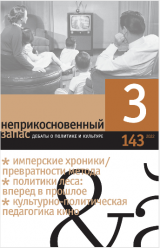Is Russia a European country?
Correspondence
Larry Wolff from the US and Alexander Yanov from Russia discuss in this exchange of letters Russia’s relation to Europe. With regard to its historical legacy, they reflect where Russia bases its political and cultural home. Is Russia maybe marked by a “civilisational instability” and “inability for political modernisation” that fundamentally set it apart from Europe? And if Russia belongs to Europe, as Wolff and Yanov argue, what defines “Europeanism” in the first place?
